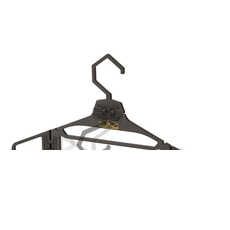
The Hangbag Converts into a Practical Hanger
Meghan Young — November 25, 2013 — Eco
References: core77
Shopping bags, and bags in general, are so practical it is no surprise they exist in abundance; yet the Hangbag redefines their purpose once they are done with. Instead of chucking away the disposable Hangbag, which is already much more eco-friendly than the classic plastic bag, it can be converted into a hanger. Thus, the Hangbag serves a dual purpose that is still in line with its original one.
Created by a team of designers based in India, the Hangbag essentially gives shopping bags another lease on life. With a few simple twists and folds, the Hangbag addresses two problems stated on Core77: "Over 1 billion paper shopping bags are used every year and only 1% end up in the recycle bin where they rightly belong. On the flip side, over 8 billion hangers are left to the landfills each year—with each hanger taking over 100 years to break down."
Created by a team of designers based in India, the Hangbag essentially gives shopping bags another lease on life. With a few simple twists and folds, the Hangbag addresses two problems stated on Core77: "Over 1 billion paper shopping bags are used every year and only 1% end up in the recycle bin where they rightly belong. On the flip side, over 8 billion hangers are left to the landfills each year—with each hanger taking over 100 years to break down."
Trend Themes
1. Sustainable Shopping Bags - Opportunity for creating innovative shopping bag designs that serve multiple purposes and have a positive environmental impact.
2. Upcycling and Repurposing - Potential for transforming everyday items into new, functional products, reducing waste and promoting sustainability.
3. Circular Economy Solutions - Growing trend of finding innovative ways to extend the lifespan and utility of products, minimizing resource consumption and waste generation.
Industry Implications
1. Retail - Retailers can explore new designs for reusable shopping bags that can be repurposed, attracting eco-conscious consumers.
2. Product Design - Designers can focus on creating innovative, multi-purpose products that promote sustainability and reduce environmental impact.
3. Waste Management - Companies in the waste management sector can adopt strategies to promote upcycling and recycling, finding new uses for discarded materials.
5.3
Score
Popularity
Activity
Freshness























